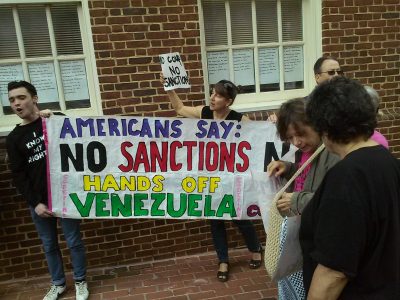Financial Warfare: Mastercard Blocks Two Venezuelan Banks as Inflation Rises
A Chinese contractor has also suspended work on an oil expansion project.

US-based financial services company Mastercard has cut service to two Venezuelan banks sanctioned by the Donald Trump administration.
Effective this past Wednesday, clients of the Bolivarian National Armed Forces Bank (BANFANB) and the Agricultural Bank of Venezuela have been cut off from Mastercard’s international payment platform.
The move comes just weeks after a US executive order freezing Venezuelan government assets in the United States and prohibiting all dealings with the Venezuelan state and its associated entities. The decree authorizes Mastercard, Visa, and other financial service firms to continue activities in Venezuela until March 22, 2020. Mastercard has yet to issue a public statement regarding its unilateral decision.
For its part, BANFANB issued a statement Wednesday accusing Mastercard of committing a “flagrant violation of our clients’ human rights.”
The state bank further announced that as of Wednesday evening it had succeeded in reconnecting its credit cards to 60 percent of the Venezuelan banking system.
The Agricultural Bank of Venezuela has yet to issue a public statement.
Earlier this year, the US Treasury Department’s Office of Foreign Assets Control (OFAC) likewise sanctioned Venezuela’s Central Bank and three other state banks.
In response to Mastercard’s pull-out, Venezuela’s National Superintendence of Banks held meetings Wednesday with banking and financial service representatives to discuss progress in building an independent financial infrastructure. Several payment platforms are under development, including the Suiche Nacional and the C2P, while a biometric payment system is currently in a trial period.
Mastercard’s decision came on the heels of a Chinese oil contractor halting expansion work in Sinovensa, a joint venture between Venezuelan state oil company PDVSA and its Chinese counterpart, China National Petroleum Corporation (CNPC). China Huanqiu Contracting and Engineering Corporation, an affiliate of the CNPC, reportedly notified Sinovensa it was suspending work from September 3, citing US $52 million in unpaid invoices.
Sinovensa had recently announced plans to expand a crude blending facility by 57 percent, to a total output of 165,000 barrels per day (bpd). The joint venture is located in Venezuela’s Orinoco Oil Belt. At the time of writing there has been no official confirmation from PDVSA or the CNPC.
Venezuela’s oil industry has seen output decline sharply in recent months as a result of corruption, brain drain, a lack of maintenance and mismanagement, and especially US sanctions.
An oil embargo imposed in late January blocked all imports of Venezuelan oil by US refineries, leading output to fall by over a third in February and March. The embargo was expanded in August to all sectors of the Venezuelan economy, with the US Treasury also threatening secondary sanctions against foreign companies that trade with Caracas.
The latest measures have resulted in the CNPC cancelling three oil shipments in August, reportedly worth around 5 million barrels. A joint venture involving US oil giant Chevron is likewise in danger, with a sanctions waiver due to expire in October.
The fallout from the latest sanctions coincided with a report from the opposition-controlled National Assembly that monthly inflation was 65.2 percent in August.
According to the legislative body’s finance commission, inflation crept back above the 50 percent hyperinflation threshold for the first time since February. The country had previously suffered 16 consecutive months of hyperinflation. The Venezuelan Central Bank released figures in May after a three-year hiatus, likewise dating the end of hyperinflation in March, but no further statistics have been released since.
August’s price rises came alongside an over 100 percent devaluation of the bolivar, both in the black market and the official exchange rate. The Venezuelan Central Bank lifted foreign exchange controls in May, allowing banks to set up “exchange tables,” but the measure has not deterred the continued devaluation of the official currency.
The liberalization of exchange controls, alongside a constriction of the quantity of bolivars in circulation, have been credited for the slowdown of inflation in the first half of 2019. However, some economists have warned that the measures have led to a contraction of demand, resulting in longer-term stagnation.
*
Note to readers: please click the share buttons above or below. Forward this article to your email lists. Crosspost on your blog site, internet forums. etc.
Ricardo Vaz reporting from Lisbon and Lucas Koerner from Venezuela.

